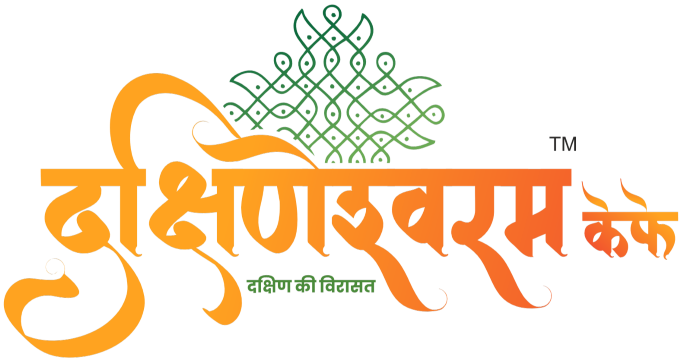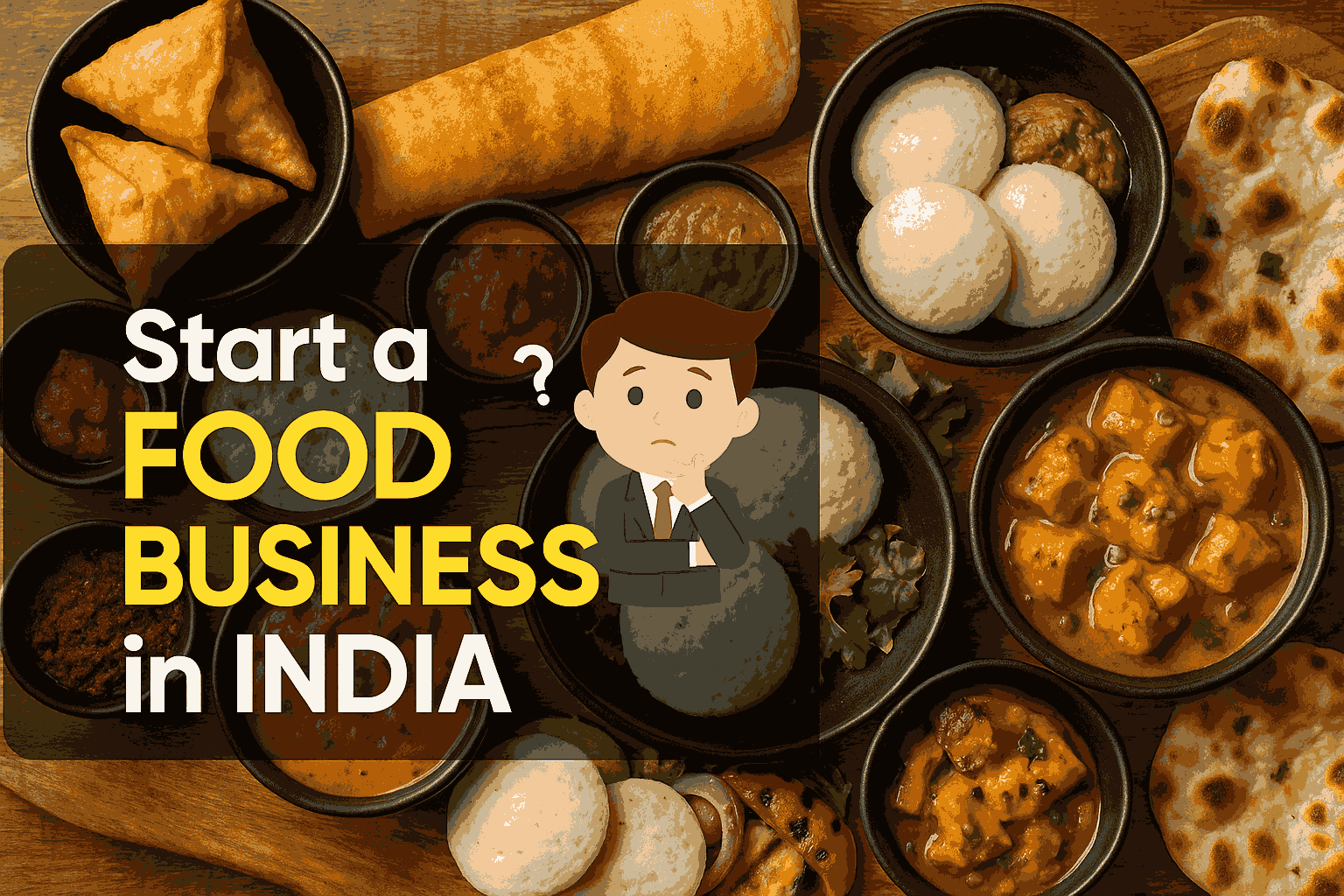India’s food industry is one of the fastest-growing in the world, with millions of entrepreneurs dreaming of opening their own restaurant or cafe. From bustling metro cities to smaller towns, people are constantly exploring new dining experiences. But while the opportunity is huge, the challenges of starting a food business in India are equally significant. Everyone wants to know ‘How to Start a Food Business in India‘, so we will give detailed guidance about it in this blog.
Should you build everything from scratch, or should you choose a proven model? The answer for many smart entrepreneurs is clear: starting with a South Indian food franchise. Franchises offer lower risks, established brand recognition, and built-in support—making them the best way to turn passion into profit.
Understanding India’s Food Industry Landscape
India’s food service market is projected to reach billions in revenue by 2025. With rising disposable incomes, urbanisation, and changing lifestyles, dining out has become more than just a luxury—it’s a habit.
Consumers today crave:
- Authenticity – Real flavours, especially regional cuisines like South Indian food.
- Health-conscious meals – Light, nutritious, and vegetarian-friendly options.
- Experiences – Dining spaces that combine culture and comfort.
This evolving demand has made South Indian food—idlis, dosas, uttapams, and filter coffee—an evergreen favourite across age groups.
Key Challenges of Starting a Food Business Independently
Starting a restaurant from scratch sounds exciting, but many first-time entrepreneurs underestimate the hurdles.
- High Setup Costs – Renting a space, designing interiors, buying kitchen equipment, and sourcing ingredients can drain capital quickly.
- Complex Licensing – FSSAI, GST, fire safety, health certificates, and local permits can be overwhelming without guidance.
- Menu Development – Crafting recipes and maintaining consistent taste is harder than it seems.
- Marketing Struggles – In India’s competitive market, new restaurants often fail to get noticed.
- Operational Hassles – Hiring, training, and managing staff is a full-time challenge.
This is why franchising has become the preferred choice—you get a proven system without reinventing the wheel.
Legal and Licensing Requirements in India
If you’re wondering how to start a food business in India, you must first meet the legal and compliance needs:
- FSSAI License – Mandatory for all food businesses.
- Shop & Establishment Act Registration – For commercial premises.
- Trade License – Issued by the municipal corporation.
- Fire & Health Clearances – Essential for customer safety.
- GST Registration – For tax compliance and billing.
For independent owners, these can be time-consuming and confusing. But with a franchise like Dakshineswaram Kafe, much of this process is guided step-by-step, making setup hassle-free.
Choosing the Right Business Model
When you decide to start a food business in India, one of the most critical decisions is selecting the right business model. The model you choose determines your investment, operations, scalability, and long-term success. Let’s explore the most common formats:
- Dine-In Restaurants
- Overview: Traditional sit-down restaurants where customers enjoy a full meal experience.
- Pros: Higher customer engagement, full menu flexibility, and strong brand building.
- Cons: High investment in interiors, staff, and maintenance; longer time to breakeven.
- Best For: Premium dining and experiential brands.
- Quick Service Restaurants (QSRs)
- Overview: Fast-food-style outlets focused on speed, convenience, and high turnover.
- Pros: Lower setup costs than dine-in, high sales volume, and suitable for urban areas.
- Cons: Menu usually limited, depends heavily on consistent taste and service.
- Best For: Popular cuisines like South Indian food, where items such as dosas, idlis, and vadas are quick to prepare and serve.
- Cloud Kitchens
- Overview: Delivery-only kitchens with no dine-in facilities, operating through apps like Swiggy and Zomato.
- Pros: Low real-estate cost, easier scalability, strong alignment with delivery trends.
- Cons: Zero customer interaction, heavy reliance on aggregator platforms for visibility.
- Best For: Entrepreneurs testing new markets or operating with limited capital.
- Food Trucks
- Overview: Mobile food outlets serving street-friendly meals in high-footfall areas.
- Pros: Low initial investment, flexible location, great for experimental concepts.
- Cons: Regulatory challenges, weather-dependent, limited seating and scalability.
- Best For: Entry-level entrepreneurs or niche food experiences.
Why Franchises Outperform Standalone Businesses
When deciding how to start a South Indian food business in India, one of the biggest choices is whether to go independent or invest in a franchise. While both models have potential, franchises consistently outperform standalone businesses for several reasons.
- Immediate Brand Recognition: Independent restaurants must spend months, even years, building a reputation. Franchises, however, give entrepreneurs the advantage of entering the market with an already trusted name, which attracts customers from day one.
- A Tested Business Model: Many independent ventures fail due to errors in menu design, pricing, or daily operations. Franchises offer a proven blueprint—recipes, systems, and processes refined over time—reducing uncertainty and increasing success rates.
- Marketing and Branding Power: Standalone owners shoulder the entire burden of marketing—logos, campaigns, and digital ads—at high costs. Franchises benefit from centralised marketing strategies, established branding, and national visibility, making it easier to compete in crowded markets.
- Comprehensive Training and Support: Managing a restaurant requires consistent food quality, customer service, and hygiene. Franchise models provide hands-on training for staff, detailed operational manuals, and ongoing support—something standalone businesses must learn through trial and error.
- Streamlined Licensing and Compliance: Getting food licenses, GST registration, fire safety approvals, and health clearances is often confusing. Franchisors help franchisees navigate these legal requirements efficiently, saving time and avoiding costly mistakes.
- Reduced Risk and Faster ROI: Franchise businesses enjoy higher survival rates compared to independent ventures. With standardised systems and bulk procurement benefits, operating costs are lower, breakeven happens sooner, and profitability is more predictable.
- Scalability and Growth: Standalone outlets often remain single-location ventures, but franchises encourage expansion. Successful franchise owners can open multiple outlets under the same brand, scaling faster than independents.
For entrepreneurs planning to tap into India’s love for South Indian cuisine, a South Indian food franchise is the smart choice. And if you’re looking for a trusted brand that combines authenticity with strong business support, Dakshineswaram Kafe stands out as the perfect partner to begin your journey.
Why a South Indian Food Franchise Works Best
South Indian cuisine is one of the most franchise-friendly models in India because:
- Dishes like idlis and dosas are quick-service friendly.
- Ingredients are relatively cost-effective, making margins higher.
- The cuisine appeals to health-conscious, vegetarian, and family-oriented customers.
- It works equally well in QSR, dine-in, or café-style models.
For entrepreneurs who want a reliable, profitable, and scalable venture, partnering with a South Indian food franchise like Dakshineswaram Kafe is the smartest choice.
Dakshineswaram Kafe: Your Best Franchise Opportunity
Among the many options, Dakshineswaram Kafe stands out as a premier South Indian food franchise in India.
- Authentic Menu – Featuring Thatte Idli, Ghee Roast Dosa, Filter Coffee, and other classics.
- Tradition Meets Innovation – Combining age-old recipes with modern dining experiences.
- Cultural Ambience – A café environment that feels warm, inviting, and community-driven.
- Strong Support – Franchisees receive end-to-end assistance in operations, marketing, and training.
Dakshineswaram Kafe is more than a restaurant—it’s an experience of South Indian culture, flavour, and hospitality.
Steps to Start a South Indian Food Franchise with Dakshineswaram Kafe
If you’re ready to begin your entrepreneurial journey, here’s how simple the process is:
- Application & Interview – Share your interest, and the team evaluates your suitability.
- Location Selection – Experts guide you in choosing the best business spot.
- Agreement Signing – Transparent terms and clear investment details.
- Training Program – Comprehensive training at central facilities and on-site.
- Cafe Setup – Interior design, kitchen equipment, and branding assistance.
- Grand Opening – Marketing campaigns and launch events to attract customers.
With this streamlined approach, you’re never alone in the journey.
Cost vs Return on Investment: Why Franchise Wins
One of the biggest reasons entrepreneurs prefer franchises is financial security.
- Lower Risk – Established systems reduce the chances of failure.
- Shared Marketing – Benefit from national campaigns and brand goodwill.
- Customer Loyalty – People trust familiar names over new entrants.
- Faster Breakeven – With high demand for South Indian food, outlets often see quick returns.
Compared to starting independently, partnering with Dakshineswaram Kafe ensures a better balance of investment and profit.
Final Thoughts
Starting a food business in India is full of opportunities, but the risks of going solo are high. From licensing to marketing, countless hurdles can overwhelm new entrepreneurs.
The smarter path is to partner with a trusted franchise model. And when it comes to South Indian food franchises in India, Dakshineswaram Kafe is the ideal choice. With authentic recipes, a strong support system, and a proven business model, it empowers entrepreneurs to succeed with confidence.
If you’re serious about starting a food business in India, start the smart way. Partner with us today and bring the rich flavours of South India to your city!
FAQs
1. How do I start a South Indian food business in India?
To start a South Indian food business in India, you need licenses (FSSAI, GST, trade), a good location, equipment, and staff. The simplest path is partnering with a franchise like Dakshineswaram Kafe, which offers complete support.
2. Is franchising better than starting a food business independently?
Yes, franchising reduces risks and ensures faster returns. With an established brand like Dakshineswaram Kafe, you benefit from proven recipes, training, marketing support, and loyal customers, which is far easier than building everything from scratch.
3. Why choose South Indian food for a franchise business?
South Indian food is loved across India for being healthy, vegetarian-friendly, and affordable. Dishes like idli, dosa, and filter coffee enjoy year-round demand, making it one of the most profitable and sustainable franchise opportunities.
4. What licenses are required to start a South Indian food business?
You need an FSSAI license, GST registration, shop and establishment certificate, fire safety clearance, and a trade license. Franchises like Dakshineswaram Kafe assist entrepreneurs in obtaining these, making compliance easier and quicker.
5. How much investment is needed for a South Indian food franchise?
Investment depends on location, size, and format (dine-in, QSR, café). Compared to standalone businesses, franchises like Dakshineswaram Kafe offer affordable models with higher ROI and faster breakeven, making them a cost-effective option.
6. What makes Dakshineswaram Kafe a good franchise choice?
Dakshineswaram Kafe offers authentic South Indian food, a proven business model, brand trust, marketing assistance, and continuous operational support. It combines tradition and modern café culture, ensuring franchise partners enjoy both profitability and customer loyalty.
7. Can I expand to multiple outlets with Dakshineswaram Kafe?
Yes, Dakshineswaram Kafe supports multi-unit ownership. Once your first outlet is successful, you can expand to more locations, backed by the brand’s strong supply chain, training, and promotional support, ensuring long-term business growth.


